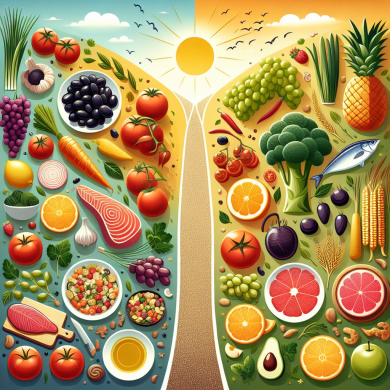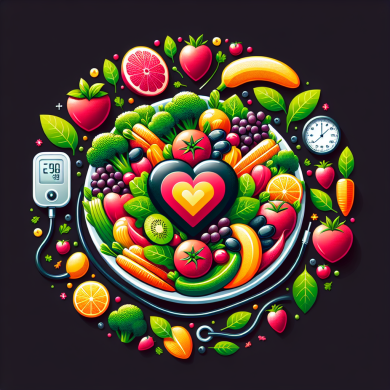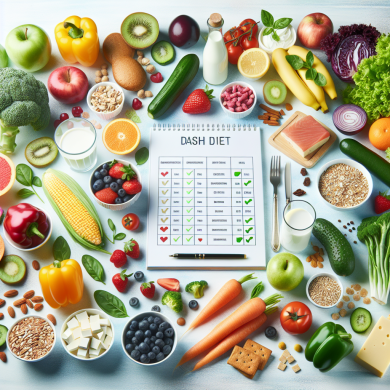Essential Foods for a Balanced DASH Diet
Introduction to the DASH Diet
The Dietary Approaches to Stop Hypertension (DASH) diet is an eating plan designed to help prevent and manage high blood pressure. Developed through research sponsored by the U.S. National Institutes of Health, this diet emphasizes the consumption of nutrient-rich foods that are low in sodium and saturated fats. The core philosophy of the DASH diet revolves around a balanced intake of various food groups to promote heart health and overall well-being.
This article will explore the essential foods that form the backbone of a balanced DASH diet. Understanding the importance of each food group and how they contribute to the diet’s effectiveness is crucial for anyone looking to adopt this healthy eating plan.
Fruits and Vegetables: The Cornerstone of the DASH Diet
At the heart of the DASH diet are fruits and vegetables, which are packed with essential vitamins, minerals, and fiber. These foods are not only low in calories but also provide a wide array of nutrients that are beneficial for heart health.
Fruits
Fruits are an excellent source of potassium, a mineral that helps regulate blood pressure. Incorporating a variety of fruits into your daily diet can provide the necessary nutrients and antioxidants that support cardiovascular health. Some fruits particularly beneficial for the DASH diet include:
– **Berries:** Blueberries, strawberries, and raspberries are rich in antioxidants and fiber.
– **Bananas:** High in potassium, bananas are great for maintaining proper blood pressure levels.
– **Citrus Fruits:** Oranges, lemons, and grapefruits provide vitamin C and flavonoids, which can help improve heart health.
Vegetables
Vegetables are critical in providing the vitamins, minerals, and fiber needed for a balanced diet. Leafy greens like spinach, kale, and Swiss chard are especially beneficial due to their high potassium and magnesium content. Other vegetables to include are:
– **Broccoli:** This cruciferous vegetable is rich in fiber and vitamin C.
– **Carrots:** High in beta-carotene and fiber, carrots contribute to a healthy diet.
– **Sweet Potatoes:** These are an excellent source of potassium and vitamin A.
Whole Grains: The Healthier Carb Choice
Whole grains are another essential component of the DASH diet, providing energy and nutrients while helping to maintain stable blood sugar levels. Unlike refined grains, whole grains retain all parts of the grain kernel, which means they are richer in fiber, vitamins, and minerals.
Some whole grains to incorporate into your diet include:
– **Brown Rice:** A versatile grain that is high in fiber and B vitamins.
– **Quinoa:** A complete protein source, quinoa is also rich in magnesium and fiber.
– **Oats:** Known for their heart-healthy benefits, oats contain beta-glucan, a type of soluble fiber that can help lower cholesterol.
Lean Proteins: Building Blocks for a Healthy Body
Protein is essential for building and repairing tissues, making it a crucial component of the DASH diet. However, it’s important to choose lean protein sources to minimize saturated fat intake. Some excellent options include:
Poultry
– **Chicken and Turkey:** Skinless white meat is lower in fat and an excellent source of protein.
Fish
– **Salmon and Tuna:** These fatty fish are rich in omega-3 fatty acids, which have been shown to improve heart health.
Legumes
– **Beans and Lentils:** These plant-based proteins are high in fiber and can help lower cholesterol levels.
Dairy: A Source of Calcium and Vitamin D
Low-fat and non-fat dairy products are recommended on the DASH diet as they provide calcium, vitamin D, and protein without the added saturated fats found in full-fat varieties. Some options to consider include:
– **Greek Yogurt:** High in protein and calcium, Greek yogurt can be a satisfying snack or breakfast option.
– **Skim Milk:** A low-fat source of calcium and vitamin D.
– **Low-Fat Cheese:** Provides calcium and can be used in moderation to add flavor to meals.
Nuts and Seeds: Nutrient-Dense Snacks
Nuts and seeds are nutrient-dense foods that offer healthy fats, protein, and fiber. They can be included as snacks or as part of meals to enhance nutritional content. Some options beneficial for the DASH diet are:
– **Almonds:** Rich in vitamin E and magnesium, almonds make a heart-healthy snack.
– **Walnuts:** High in omega-3 fatty acids, walnuts can support cardiovascular health.
– **Chia Seeds:** Packed with fiber and omega-3s, chia seeds can be added to smoothies or yogurt.
Healthy Fats: Essential for Heart Health
While the DASH diet limits saturated and trans fats, it encourages the consumption of healthy fats found in foods like avocados, nuts, and olive oil. These fats can help improve cholesterol levels and support overall heart health.
– **Olive Oil:** A primary source of monounsaturated fats, olive oil is a healthier alternative to butter or margarine.
– **Avocado:** Provides monounsaturated fats and is also a good source of potassium and fiber.
Herbs and Spices: Flavor Without the Sodium
One of the key principles of the DASH diet is reducing sodium intake to manage blood pressure. Herbs and spices can be used to add flavor to dishes without the need for added salt. Some popular choices include:
– **Garlic:** Known for its potential heart health benefits, garlic can enhance the flavor of a variety of dishes.
– **Basil and Oregano:** These herbs can be used in Italian and Mediterranean dishes as flavorful salt substitutes.
– **Turmeric:** With its anti-inflammatory properties, turmeric can be added to a variety of recipes.
Conclusion: Building a Balanced DASH Diet
Creating a balanced DASH diet involves making thoughtful choices about the foods you consume daily. By focusing on whole, nutrient-rich foods like fruits, vegetables, whole grains, lean proteins, and healthy fats, you can effectively manage your blood pressure and support overall health. Reducing sodium intake and opting for herbs and spices to flavor meals also play crucial roles in the success of this diet.
As with any dietary change, it’s important to consult with a healthcare provider or a registered dietitian to ensure that the DASH diet is tailored to meet your individual health needs. By embracing the essential foods outlined in this article, you can take meaningful steps toward achieving a healthier lifestyle through the DASH diet.















Add comment